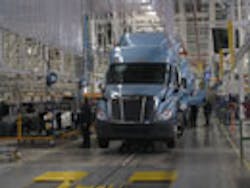Saltillo, Mexico. While some might call the decision to open an all-new $300-million truck plant in this economic environment “muy loco,” it is “the right investment at the right time in the right place,” according to Andreas Renschler, the head of Daimler Trucks and board member of parent Daimler AG. The Saltillo plant was designed to showcase all of the company’s benchmark truck manufacturing processes and to lead in efforts to “create expertise for our global operations,” he said at opening ceremonies on Friday.
Operated by Daimler Trucks North America, the new plant has begun building Freightliner Cascadia tractors at a ramp-up rate of just eight trucks a day for export to the U.S., but has the capacity to produce 30,000 trucks a year on two shifts and room to expand on its 740-acre site.
DTNA already has another heavy- and medium-duty truck plant in Santiago Tianguistenco, Mexico with similar capacity building trucks for the North American and Latin American markets.
Saltillo, Mexico. While some might call the decision to open an all-new $300-million truck plant in this economic environment “muy loco,” it is “the right investment at the right time in the right place,” according to Andreas Renschler, the head of Daimler Trucks and board member of parent Daimler AG. The Saltillo plant was designed to showcase all of the company’s benchmark truck manufacturing processes and to lead in efforts to “create expertise for our global operations,” he said at opening ceremonies on Friday.
Operated by Daimler Trucks North America, the new plant has begun building Freightliner Cascadia tractors at a ramp-up rate of just eight trucks a day for export to the U.S., but has the capacity to produce 30,000 trucks a year on two shifts and room to expand on its 740-acre site.
DTNA already has another heavy- and medium-duty truck plant in Santiago Tianguistenco, Mexico with similar capacity building trucks for the North American and Latin American markets.
The company is in the process of shutting down its truck plant in St. Thomas, Ontario, which also had a 30,000-truck capacity, and has significantly scaled back production at its Portland, OR, plant. Portland is currently building the company’s Western Star tractors and vehicles for military contracts, but that plant is scheduled to close in July with production transferring to Santiago.
DTNA also has a heavy-duty plant in Cleveland, NC, and a medium-duty plant in Mt. Holly, NC. Its Freightliner Custom Chassis Corp. brand builds light-duty vehicles in Gaffney, SC, and its Thomas Built Buses operation has another manufacturing facility in High Point, NC.
“Not all (DTNA) production will go to Mexico, but we realize it is a large market with great potential for us,” said Chris Patterson, president & CEO of DTNA. While there are no current plans to add medium-duty trucks to the Saltillo production mix, he said “we have the room.”
Roger Nielsen, DTNA COO, pointed out that while “the cost of doing business – labor—is lower (in Mexico), the logistics costs are higher and more dependent on fuel costs.”
Aside from cost and market issues, the Saltillo plant was a greenfield project intended to set benchmark manufacturing standards for Daimler’s global operations.
“Seeing it crowned as one of most modern and efficient manufacturing plants in the world makes us proud,” said Mexican President Felipe de Jesus Calderon Hinojosa in the official opening ceremonies in Saltillo. Despite the current economic downturn, “It is a good business decision,” said Pres. Calderon. “This plant is not designed for the next few months, but strategically for the future.”
Among the Saltillo plant’s advanced features are a “lean truck operation system” intended to provide the highest quality trucks as the lowest production costs, according to Renschler. The system focuses on fixing problems right on the assembly line and relies on continuous feedback to improve quality and processes. The new facility also incorporates state-of-the-art environmental controls, including systems to recycle 90% of all materials, waste treatment and co-processing, and extensive use of natural light and solar controls to minimize electrical power requirements, according to DTNA.
About the Author
Jim Mele
Jim Mele is a former longtime editor-in-chief of FleetOwner. He joined the magazine in 1986 and served as chief editor from 1999 to 2017.
